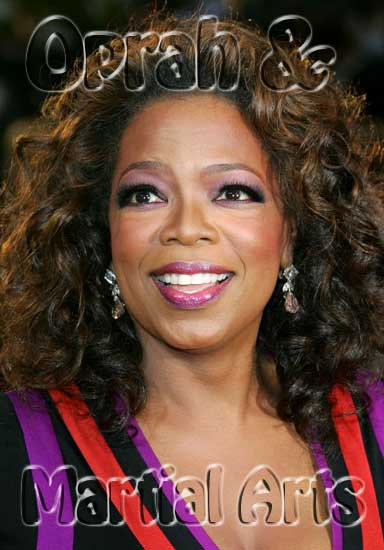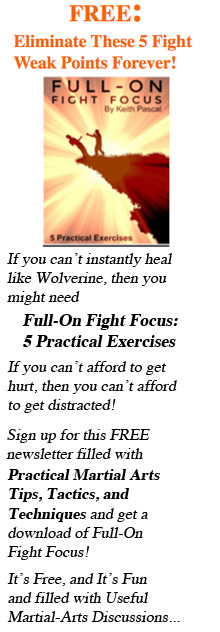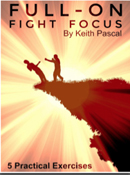Oprah Quote applied to Self-Defense
An Oprah Winfrey quote that concerns martial arts?
Have I gone bazonkers?
 I certainly hope not. And yes, I am sane enough to know that Oprah probably doesn’t really have anything to do with self-defense. But believe it or not, from time to time, she says something that resonates with me — it starts me thinking in a martial context.
I certainly hope not. And yes, I am sane enough to know that Oprah probably doesn’t really have anything to do with self-defense. But believe it or not, from time to time, she says something that resonates with me — it starts me thinking in a martial context.
In fact, I even included her in a dedication in the front of one of my books.
Well, recently another blogger sent me an email with this quote:
Be thankful for what you have; you’ll end up having more. If you concentrate on what you don’t have, you will never, ever have enough.”
— Oprah Winfrey
Martial-Arts Techniques: More or Less?
There is a big debate in the world of martial arts: One camp believes that the more techniques you know, the better you become as a fighter. The other camp’s belief is just the opposite — to be effective, you need a small, efficient set of techniques. Too many moves in your head, and you won’t be able to call them into play quickly.
- [There is scientific evidence that too many choices slows an automatic response/trained reaction.]
I have already provided a logical plan for when to increase and when to reduce the number of moves in your working repertoire. Write me, if you need me to point your toward the ebook.
What Does This Have to Do with the Oprah Quote?
As I said, the illustrious mogul’s quote got me thinking (thanks, O.) — what if the quest for more techniques is like the second part of Oprah’s saying? What if that particular quest only helps you improve to a certain point, and after that, if get’s in the way of your martial competence?
And what if being “thankful for what you have” means spending time perfecting what you already know in the martial arts?
Think of it this way: the best martial artists can win a fight with a single, well-placed, perfectly timed punch or kick. It doesn’t have to be anything fancy; the martial-arts move just has to be used correctly.
If you can’t make the martial arts techniques that you already know function effectively, then what makes you think that some other punch, kick, or elbow strike is suddenly going to be more effective?
Martial Arts Secrets?
So, if I am supporting the “less is more” side of the martial-arts debate, does that mean there are no secrets in martial arts?
Not at all. Of course, there are martial-arts secrets. Just maybe not the kind you were thinking of.
For example, my entire focus on practical-application writing is to show you how to make your “stuff” work. I don’t care if you use old moves or new ones; you need to be able to defend yourself against someone who will have his or her set of moves.
So, my thought for the day is that one of the “hidden gems of martial arts” is to focus on making what you already know effective. (I am here to help.)
Thoughts?
Tags: less techniques, more or less moves, more techniques, oprah martial arts, oprah quote, oprah winfrey, solo training, train alone



I think this issue speaks to the amount of repetitions a person does when practicing a technique. I think a good functional “tool set” burned into neuro-muscular memory is better than two or three hundred unpracticed techniques.
If you are interested in “burning” skills into neuro-muscular memory, there has bee a lot of recent research on strengthening the myelin sheaths in the brain.
It’s actually quite fascinating research … let’s me know that little frustration during practice can be a good thing.
Keith
I am a strong believer in less is more concepts I teach a blend of Arnis and Systema (russian) and only focus on burning in the neuro-muscular memory what works.
One technique is enough as long as it is effective or deadly. Having many technique in martial art though they are less effective, is also good, but for demonstration purpose only.
Interesting:
“Burning” neuro-muscular memory makes me think of Bruce Lee Kicking someone just inches away- automatically; Supporting the “Burning” technique? Burned or automatic? Who Knows.
A Student wants to know how to “Punch” while hitting your target without any wasted energies, so to speak.
The Teacher takes the students wrist watch and throws it into the air.
The student wasted no “energies” shooting his hand straight at the “Watch” with absolute Accuracy. And that is ntially how it is done- with great practice, however.
Now- Bruce Lee thought that all “Martial Arts” had a “Fixed Position”, if you will. Therefore, Bruce Lee created “JKD” which is a combination of The “Martial Arts;” However, Bruce wished that he hadn’t named it -In naming it he created another art. Which of course, is not what he had wanted. He wanted “Formlessness, and “No Fixed Positions:, which he did create “JKD.” A “Master” Like no other- One of A KIND!
it is better to know more
It is best to practice a range of practical powerful techniques. This need not be excessively many. The reason, from some personal experience, is that under serious threat conditions you need to be able to produce the appropriate ‘one hit’ to take control. There is no time to think.
So I do think that Oprah’s quote has some application. Be happy with the skills you can learn from your chosen martial art and practice them to a point that you
‘Master The Basics’ as stated by Yamaguchi, and
(continued) then you can examine the many other techniques, not in a spirit of being discontent with what you have, but to enrich the skills you have.
I like Oprah’s statement but do not like her choice of books in her book club!
I’m just curious — what’s wrong with her choice of books?
(I’d love for her to recognize one of mine.)
Keith
We aren’t talking “knowledge.”
I am talking about practical application … what you have
at the ready … practiced, ready to respond with.
For example, there is a self-proclaimed “ninja warrior”
who has some garbage about the necessity to know
and have practiced 88 different punches.
I’d put my money on the person who has practiced
just a couple of punches … applied to any situation.
Keith
Mark,
Of course, I agree with you. And there is a lot of scientific evidence to back it up.
Thanks for posting, btw. And thanks to all the others, too. The more you all post, the more … I add new threads. I appreciate the discussions.
Keith
I say it’s good to learn a bunch of techniques, because you don’t know what will work best for you until you’ve already learned them. Then, prune the useless and relearn the useful. By relearn, I mean master, and only as many as you personally feel you could recall in a fight. Eventually, the techniques cease being techniques and just become part of you.
I no longer focus on striking, except to improve the attributes necessary to make the strikes effective. Now, it’s all grappling, wrist locks, and throws. Eventually, many will be thrown away and the rest will be integrated with no need to think on the proper execution. Fights are mindless, so the reaction should be reflex. 🙂
Think of it in stages … lots of techniques, when you are a beginner … fewer techniques,
when you get good.
I know that seems counterintuitive, but trust me … it’s the natural law of practical martial arts.
Keith